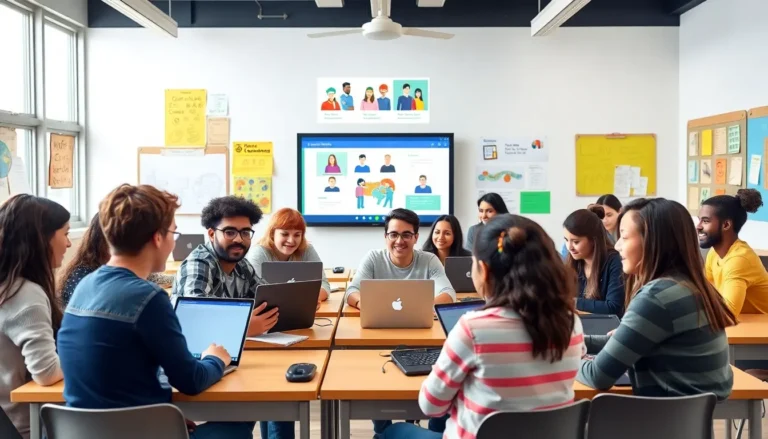In a world where students can learn anything from coding to cooking with just a click, the role of edtech designers has never been more crucial. These creative geniuses blend technology with education, crafting engaging experiences that keep learners hooked. Imagine a classroom where lessons feel more like a video game than a snooze-fest—sounds dreamy, right?
Table of Contents
ToggleImportance Of Hiring Edtech Designers
Hiring edtech designers significantly impacts modern education. These professionals blend technology with pedagogy to craft learning experiences that resonate with students.
Enhancing Learning Experiences
Edtech designers enhance learning experiences through interactive content. Engaging multimedia elements such as videos, quizzes, and simulations capture students’ attention. Tailoring educational materials for various learning styles ensures accessibility for everyone. Students benefit from personalized learning paths aligned with their needs. These designers use data analytics to refine course content continually, maximizing effectiveness over time. By creating immersive environments, they stimulate critical thinking and collaboration among peers.
Improving User Engagement
User engagement improves with expertly designed educational tools. Intuitive interfaces invite students to explore content easily. Progress tracking features motivate learners by visualizing their achievements. Feedback loops keep students informed about their performance, fostering a sense of accomplishment. Frequent updates and new features maintain interest and encourage regular use of learning platforms. Edtech designers understand the importance of gamification, transforming educational tasks into rewarding experiences.
Qualities To Look For When You Hire Edtech Designers


When hiring edtech designers, certain qualities enhance the effectiveness of learning experiences. Identifying these attributes can streamline the selection process.
Creativity And Innovation
Creativity is essential for edtech designers. They must generate fresh ideas that transform traditional learning into engaging experiences. Innovative designers utilize multimedia elements, gamification, and interactivity to capture learners’ attention. Creating unique educational tools requires the ability to think outside the box. When scenarios change, designers should adapt their creativity to meet evolving educational needs.
Technical Proficiency
Technical proficiency matters significantly for edtech designers. Understanding various software and tools is crucial for developing interactive content. They should possess skills in coding languages and design software to create functional platforms. Familiarity with user experience principles ensures designs are intuitive and user-friendly. Moreover, expertise in data analytics aids designers in refining materials based on learner feedback and performance metrics. Standard specifications in educational technology keep the content relevant and effective.
The Hiring Process For Edtech Designers
The hiring process for edtech designers involves various critical steps to ensure the right fit for the organization. This includes crafting clear job descriptions and thoroughly evaluating candidates’ credentials.
Creating A Job Description
Crafting a precise job description attracts qualified candidates. Start by outlining specific responsibilities such as curriculum design and multimedia integration. Include required technical skills that align with platforms used in your organization. Specify preferred experience in educational environments or familiarity with education technology trends. Incorporate soft skills like creativity and communication that enhance collaboration within teams. Highlight the importance of strong analytical abilities to utilize data effectively, ensuring applicants understand the multifaceted role involved in designing engaging educational content.
Evaluating Portfolios And Resumes
Evaluating portfolios and resumes helps identify the most suitable candidates. First, assess the quality and variety of previous projects showcased in portfolios. Look for evidence of innovative design solutions that engage learners effectively. Analyze how well candidates align their work with pedagogical strategies. Consider the depth of their resumes, particularly relevant education and industry experience. Interviews should probe candidates on their design process, including collaboration with educators and adaptation to feedback. This approach facilitates a well-rounded understanding of how candidates approach edtech design challenges.
Collaboration With Edtech Designers
Collaboration forms the foundation of effective partnerships between edtech designers, educators, and stakeholders. Working together fosters a shared understanding of goals and learning outcomes.
Working With Educators And Stakeholders
Edtech designers need to build strong relationships with educators to align projects with pedagogical goals. Understanding educators’ needs facilitates the creation of tailored solutions, enhancing student engagement. Collaborating with various stakeholders, including administrators and curriculum developers, ensures all perspectives are considered. Feedback from these stakeholders helps edtech designers refine their approaches, leading to more relevant and effective learning experiences. Frequent communication throughout the design process aids in clarifying goals and addressing concerns, promoting a sense of ownership among all parties involved.
Iterative Design Process
The iterative design process emphasizes continuous improvement in educational technology products. Designers create prototypes that undergo testing and evaluation, incorporating feedback at each stage. This method allows for adjustments based on user interaction and learning efficacy. Engaging educators during testing phases provides essential insights, ensuring designs effectively meet classroom needs. Designers can identify potential issues early, leading to refined final products. The focus remains on enhancing usability, fostering a cycle of consistent evaluation and improvement that directly benefits learners.
Hiring edtech designers is crucial for creating engaging and effective learning experiences in today’s digital landscape. Their unique blend of creativity and technical skills enables them to craft interactive content that resonates with diverse learners. By focusing on user engagement and incorporating data-driven insights, these professionals ensure that educational tools remain relevant and impactful.
Collaboration with educators and stakeholders further enhances the design process, aligning projects with pedagogical goals. As the educational environment continues to evolve, investing in skilled edtech designers is essential for fostering innovation and improving learning outcomes. Embracing their expertise can transform traditional classrooms into dynamic learning spaces that inspire and motivate students.








